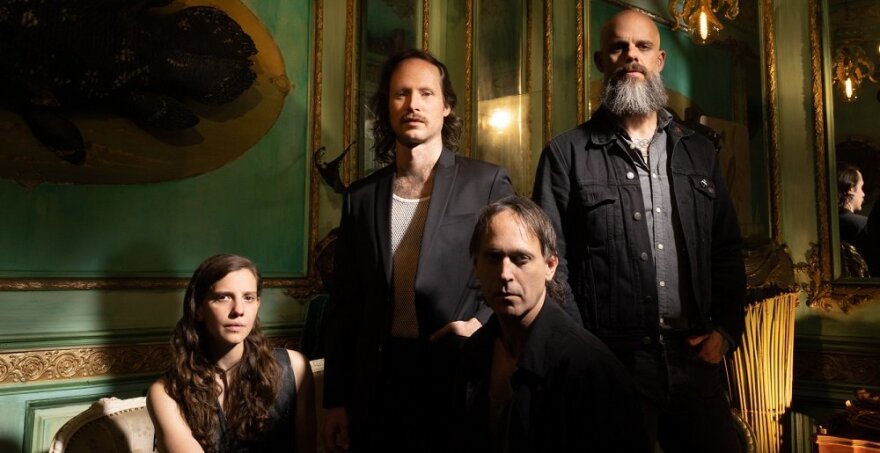John Baizley doesn’t sound like a man trying to defend a metal record. He sounds like someone slowly peeling wallpaper off a burning house.
“Maybe the music sounds heavy because we were completely unsettled when we made it,” he says. “There was no resolution in the writing.”
The album is called Stone, and like most Baroness titles, it’s deceptively simple. On the surface: earth, weight, permanence. Dig deeper, and it’s about friction. “The metaphorical kind,” Baizley says. “A sense of being ground against something hard. We were all struggling.”
That tension is audible—raw, beautiful, off-kilter. It’s also baked into how the record was made: five weeks holed up in a remote house in the woods, recording with no producer, no budgeted studio time, no fallback plan. “We had to make this thing work with duct tape and elbow grease,” Baizley says. “There’s nothing stopping us from failing. So that’s why we succeeded.”
It’s the first Baroness album since their color-coded period ended (Red, Blue, Yellow & Green, Purple, Gold & Grey). It’s also the first to feature Baizley’s unfiltered demos on the final cut. “I wasn’t even planning to show those to anyone,” he admits. “But when we got into the studio, it was like, ‘Wait… the best version of the song might’ve already happened.’”
Take “Last Word.” It opens the record with Baizley’s scratchy demo vocals straight off his iPhone. “That was me singing in the living room,” he says. “I was like, ‘Don’t use that.’ Everyone else was like, ‘You’re outvoted.’”
It’s the kind of vulnerability that would've been heresy in their earlier days—back when Baizley’s voice was buried under distortion and density. “I used to hate hearing myself sing,” he says. “Now it’s part of the point.”
He talks about songwriting like someone chasing ghosts: “Every song is a problem to solve. Sometimes it takes five minutes. Sometimes it takes ten years. Or twenty.” One track on Stone was resurrected from a failed writing session in 2006. “It just sat in a hard drive labeled ‘junk.’ Then one day, it clicked.”
Failure isn’t just accepted in Baroness—it’s institutional. “Some songs suck,” Baizley says bluntly. “Some of them are terrible. But that’s okay. Because eventually we get to the ones that say something.”
What they’re saying now is different than it used to be. Stone isn’t quite metal, not quite Americana, not quite post-rock, not quite anything. There are clean guitars and fingerpicking. Synths that sound like rotted organs. Vocals that crack and splinter. “We don’t belong to a genre anymore,” Baizley says. “We don’t want to.”
He credits part of that shift to their fans—specifically, the ones who don’t care what Baroness is “supposed” to sound like. “There’s a freedom in not being beholden to someone’s idea of you. We’ve been lucky to find people who let us grow.”
That doesn’t mean they’re coasting. “I’m still chasing the perfect song,” he says. “Still trying to figure out what makes something feel right. Sometimes it’s melody. Sometimes it’s tension. Sometimes it’s just that you managed to not fuck it up.”
Baizley is part craftsman, part chaos manager. He knows how to step back and let a song twist into something unplanned. “Improvisation is key. I’ll write a whole song, then throw it away if someone else finds a better riff in the moment.”
The band—now a tight four-piece with Gina Gleason on guitar and vocals, Nick Jost on bass and synths, and Sebastian Thomson on drums—functions like a hive mind with occasional emotional outbursts. “Gina and I finish each other’s musical sentences,” Baizley says. “Nick brings this sense of elegance and theory. Seb’s a machine—he holds everything down. Together, we have just enough friction to keep it interesting.”
Fracture, in fact, is kind of the point.
“It’s not just about catharsis,” Baizley says. “It’s about what happens after catharsis. What’s left when you burn it all down?”
On Stone, what’s left is bare and bruised and often beautiful. “Shine,” the album’s centerpiece, sounds like a lost Nick Cave dirge filtered through an Appalachian hymn. “Beneath the Rose” opens with arpeggios that could pass for a Springsteen demo, if Bruce had grown up on Bad Brains and Codeine. “Magnolia” is both a lullaby and a last rite.
“People hear heaviness and think aggression,” Baizley says. “But there’s a different kind of heaviness in sadness. In longing. In remembering.”
He says he listens to a lot of 90s indie—Pavement, Smog, early Radiohead. “That was the stuff that taught me restraint. That sometimes what you don’t play matters more than what you do.”
Baroness, despite their blistering history, are getting quieter. Or at least, more deliberate. “I’m not screaming as much,” Baizley says. “I’m trying to communicate.”
He laughs, then stops himself. “That sounds trite. But it’s true.”
Stone isn’t a reinvention. It’s a distillation—of every jagged, searching impulse the band’s had for two decades. “We used to throw paint at the wall and see what stuck,” Baizley says. “Now we’re trying to draw the shapes inside the mess.”
And if you still want the old Baroness—the color-coded, pedal-stomping, riff-driven juggernaut—they haven’t gone anywhere. But they’re not standing still either. “This isn’t a break from the past,” Baizley says. “It’s the past, broken open.”
Watch the interview above and then check out the video below.


